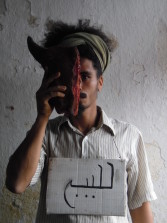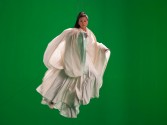
As other artists and scholars have targeted ethnographical museums effectively, questioning their colonial heritage, Nazareth adds elements of his personal history to the discourse. While loosely knitting together elements and fragments of histories and his own adventures, Nazareth’s actions evoke a sense of a search for fairness. It seems as if loops and holes exist, little pockets of time and space in between his performances, his writing, in the way he talks his mix of languages, his broken English, that provide room for interpretation and for engagement.



